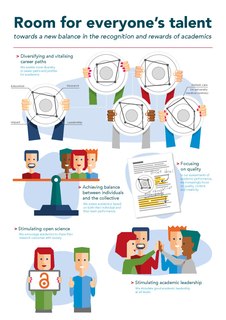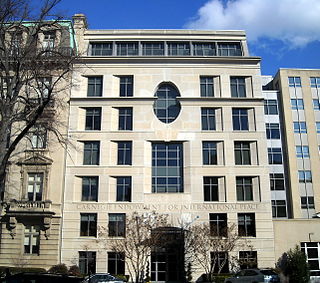
The United Nations Development Programme (UNDP) is a United Nations organization tasked with helping countries eliminate poverty and achieve sustainable economic growth and human development. Headquartered in New York City, it is the largest UN development aid agency, with offices in 170 countries.

Innovation is the practical implementation of ideas that result in the introduction of new goods or services or improvement in offering goods or services. ISO TC 279 in the standard ISO 56000:2020 defines innovation as "a new or changed entity realizing or redistributing value". Others have different definitions; a common element in the definitions is a focus on newness, improvement, and spread of ideas or technologies.

Research and development, known in Europe as research and technological development (RTD), is the set of innovative activities undertaken by corporations or governments in developing new services or products, and improving existing ones. Research and development constitutes the first stage of development of a potential new service or the production process.

Science policy is concerned with the allocation of resources for the conduct of science towards the goal of best serving the public interest. Topics include the funding of science, the careers of scientists, and the translation of scientific discoveries into technological innovation to promote commercial product development, competitiveness, economic growth and economic development. Science policy focuses on knowledge production and role of knowledge networks, collaborations, and the complex distributions of expertise, equipment, and know-how. Understanding the processes and organizational context of generating novel and innovative science and engineering ideas is a core concern of science policy. Science policy topics include weapons development, health care and environmental monitoring.
The Mexico City policy, sometimes referred to by its critics as the global gag rule, is a United States government policy that blocked U.S. federal funding for non-governmental organizations (NGOs) that provided abortion counseling or referrals, advocated to decriminalize abortion, or expanded abortion services. When in effect, the Mexico City policy is a U.S. government policy that requires foreign non-governmental organizations to certify that they will not "perform or actively promote abortion as a method of family planning" with non-U.S. funds as a condition for receiving U.S. global family planning assistance and, as of January 23, 2017, any other U.S. global health assistance, including U.S. global HIV and maternal and child health (MCH) assistance.

The Carnegie Endowment for International Peace (CEIP) is a nonpartisan international affairs think tank with its headquarters in Washington D.C.and centers in Moscow, Beirut, Beijing, Brussels, and New Delhi. Founded in 1910 by Andrew Carnegie, the organization describes itself as being dedicated to advancing cooperation between nations and promoting active international engagement by the United States.
Technology governance means the governance, i.e., the steering between the different sectors—state, business, and NGOs—of the development of technology. It is the idea of governance within technology and its use, as well as the practices behind them. The concept is based on the notion of innovation and of techno-economic paradigm shifts according to the theories of Joseph A. Schumpeter, Christopher Freeman, Carlota Perez, etc.
The Munk School of Global Affairs and Public Policy at the University of Toronto is an interdisciplinary academic centre with various research and educational programs committed to the field of globalization. Located in Toronto, Ontario, it offers master's degrees in global affairs and public policy, as well as in European, Russian and Asia-Pacific studies. The school is a member of the Association of Professional Schools of International Affairs (APSIA), a group of schools that educate students in international affairs. Admission to the Munk School is highly competitive; the Master of Global Affairs program typically receives between 500 and 600 applicants per year but offers only 80 first-year places.
The Carnegie Council for Ethics in International Affairs is a New York City-based 501(c)3 public charity serving international affairs professionals, teachers and students, and the attentive public. Founded in 1914, and originally named Church Peace Union, Carnegie Council is an independent and nonpartisan institution, aiming to be the foremost voice of ethics in international affairs. The Council focuses on, Ethics, War and Peace, Global Social Justice, and Religion in Politics as its three main themes. It is separate and independent from all other Carnegie philanthropies.
The Global Health Council is a United States-based non-profit leading networking organization "supporting and connecting advocates, implementers and stakeholders around global health priorities worldwide". The Council is the world's largest membership alliance dedicated to advancing policies and programs that improve health around the world. The Council serves and represents thousands of public health professionals from over 150 countries. They work "to improve health globally through increased investment, robust policies and the power of the collective voice.": According to their website the Council "convenes stakeholders around key global health priorities and actively engages key decision makers to influence health policy."
The Centre for India & Global Business (CIGB) is a research center was launched in March 2009 as part of Cambridge Judge Business School at the University of Cambridge, England, to support the university's growing engagement with India. As a research centre and an engagement platform CIGB is dedicated to the study of India's rapidly expanding role in the global knowledge economy.
The Partnership for New York City, formerly called the New York City Partnership, is a nonprofit membership organization consisting of a select group of nearly three hundred CEOs ("Partners") from New York City's top corporate, investment and entrepreneurial firms. The organization was founded by David Rockefeller in 1979, with the aim of working closely with government, labor and the nonprofit sector to enhance the economy and maintain New York City's position as the global center of commerce, culture and innovation.

Financial technology is the technology and innovation that aims to compete with traditional financial methods in the delivery of financial services. It is an emerging industry that uses technology to improve activities in finance. The use of smartphones for mobile banking, investing, borrowing services, and cryptocurrency are examples of technologies aiming to make financial services more accessible to the general public. Financial technology companies consist of both startups and established financial institutions and technology companies trying to replace or enhance the usage of financial services provided by existing financial companies. A subset of fintech companies that focus on the insurance industry are collectively known as insurtech or insuretech companies.

The Department for Business, Energy and Industrial Strategy (BEIS) is a department of the government of the United Kingdom. The department was formed during a machinery of government change on 14 July 2016, following Theresa May's appointment as Prime Minister, through a merger between the Department for Business, Innovation and Skills (BIS) and the Department of Energy and Climate Change (DECC).

Innovation and Technology Bureau (ITB) is one of the policy bureaus under the Government Secretariat of the Government of Hong Kong and is responsible for policy matters on the development of innovation and technology and information technology which are the key drivers in this endeavour. The Bureau is led by the Secretary for Innovation and Technology, currently Alfred Sit Wing-hang.

The New Zealand Space Agency is the public service department of New Zealand charged with "space policy, regulation and business development" relating to space activities in New Zealand.
The Australian Space Agency is Australia's national agency responsible for the development of Australia's commercial space industry, coordinating domestic activities, identifying opportunities and facilitating international space engagement that include Australian stakeholders. Its headquarters are located in Adelaide, the southeastern capital city of South Australia.

Natalia Gavrilița is a Moldovan economist and politician who has served as prime minister of Moldova since 2021. The third woman to hold the office, Gavrilița was previously proposed as prime minister by Maia Sandu in February 2021, but was rejected by the PSRM-Șor parliamentary majority. She was proposed once again in August 2021, following the 2021 parliamentary election, and was approved along with her cabinet.









